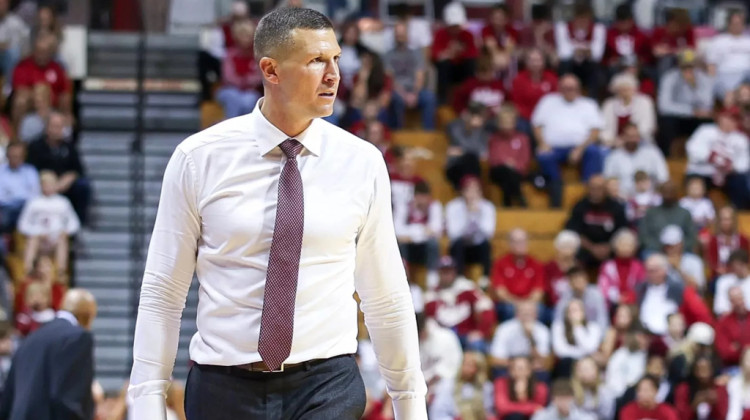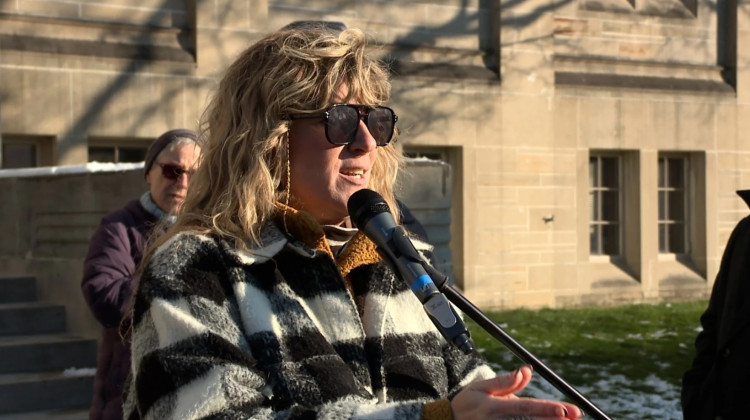
Patrick Mapes was appointed as the superintendent of Hamilton Southeastern Schools on Feb. 28 by the district board of trustees. Mapes (center) talks to district staff at the district central office on Monday, March 4, 2024.
Courtesy of Hamilton Southeastern SchoolsThe new leader of Hamilton Southeastern Schools is already making some moves.
Pat Mapes, who led Perry Township Schools until 2023, now oversees HSE’s more than 21,000 students after the school board appointed him this month.
Mapes sat down with WFYI to discuss his plans for the district that’s struggled over the last year with changes in leadership, administrative departures and public divide surrounding the school board’s decisions.
You can read excerpts from that conversation here.
Second and third graders sitting for IREAD-3
In Mapes' early days, he made his way to all of the district schools. At each stop, he had conversations with teachers and students, he said.
Mapes also started handing out directives. He was told only three elementary schools were testing second graders for the IREAD-3, the state’s standardized reading assessment that’s required for all third grade students.
Now all of the district’s second grade students will sit for the test this month, a year ahead of a new state requirement.
“That's really important because to continue to build the skills of these kids who have passed, but you can break out small groups and build skills of the kids who are struggling a little bit and haven't passed the test yet,” Mapes said. “I hope that allows us to have a much smaller group that we're concentrating on as third graders so we wouldn't have to retain.”
Senate Bill 1, legislation lawmakers sent off to Gov. Eric Holcomb, seeks to hold back more students that fail IREAD in addition to requiring all schools to administer the test to second grade students starting next school year.
Diversity equity and inclusion program will look different
HSE’s diversity, inclusion and equity director left in December. Mapes said he plans to ensure students have access to opportunities, but that won’t include a separate diversity, equity and inclusion position.
As an example of this approach, Mapes said his former administrators in Perry schools noticed that incoming freshman, Hispanic students were not taking advantage of AP or dual credit courses as other students. They found it was rooted in a scheduling issue for many students, so they worked to try to bridge that gap.
“We have to do the same thing here,” Mapes said. “But it can't happen just from the central office. It has to happen boots on the ground in the buildings, and our directors of secondary and elementary education will look at those subgroups and make certain that we're giving them access.”
During the August meeting of the State Board of Education, Mapes told board members that low reading competency for non-White and English Language Learners are because they “don't want to go to school today and nobody is making them…”
In response to that statement, Mapes said, in general, chronic absenteeism is a problem across the board.
“Our attendance rates of chronic absenteeism across the state is kind of appalling. And I think part of that is parents have to realize the value of what we're providing in schools and we've kind of lost that,” Mapes said. “This is a partnership. We sit here and wait for kids to come to school each and every day. If there's not an emphasis at home of the value of an education, and where you can go if you have a quality education, then students can't figure that out yet.They're not mature enough to understand, but their parents should understand that.”
‘We're going to address it and say it out loud’
The Hamilton Southeastern school board has caught public attention for swift changes by the new conservative majority.
Under that leadership, board members removed microaggression language from student handbooks, nearly halted a multi-million dollar mental health grant and did away with a districtwide survey. The board was also hit with several Open Door Law and public access complaints.
The state’s public access counselor did not find any formal violation of the laws but concluded the board should prioritize transparency.
“I'm not gonna dwell on the past,” Mapes told WFYI. “I've always led a very transparent organization.”
Former Superintendent Yvonne Stokes resigned from her position in the first week of this school year. Her departure fueled more debate about the board’s relationship with Stokes and the public at large.
District leaders will address issues publicly, Mapes said.
“We're gonna listen to concerns and we'll seek out whether or not they're true,” Mapes said “If something maybe not favorable for us is happening. We're going to address it and say it out loud. We're not going to try to polish something up that isn't true to make it look good.”
A new survey system in the district?
Starting in 2019 HSE surveyed students through a contract with Boston-based Panorama Education. But last March, the school board voted to halt that partnership and stop surveys all together.
Surveys are essential, Mapes said.
“If you're really trying to get better in your organization, I don't care if your education or some other profession, you're doing surveys because that's how you get feedback,” Mapes said.
The key is to select a survey and then adjust preferred questions, Mapes said that’s how they did it in Perry Township where they used Panorama.
During his time in Perry, Mapes said they rejected survey questions from the Indiana Youth Survey because it asked young people if they were sexually active. It also asks about substance use, alcohol and tobacco.
Mapes hopes to bring back some type of survey in the district, possibly even Panorama again, he said.
“I hope our board is open minded enough that they understand that it's not the delivery system that's doing maybe some harm,” Mapes said. “It's the questions within that survey.”
Rachel Fradette is the WFYI Statehouse education reporter. Contact Rachel at rfradette@wfyi.org.
 DONATE
DONATE






 Support WFYI. We can't do it without you.
Support WFYI. We can't do it without you.